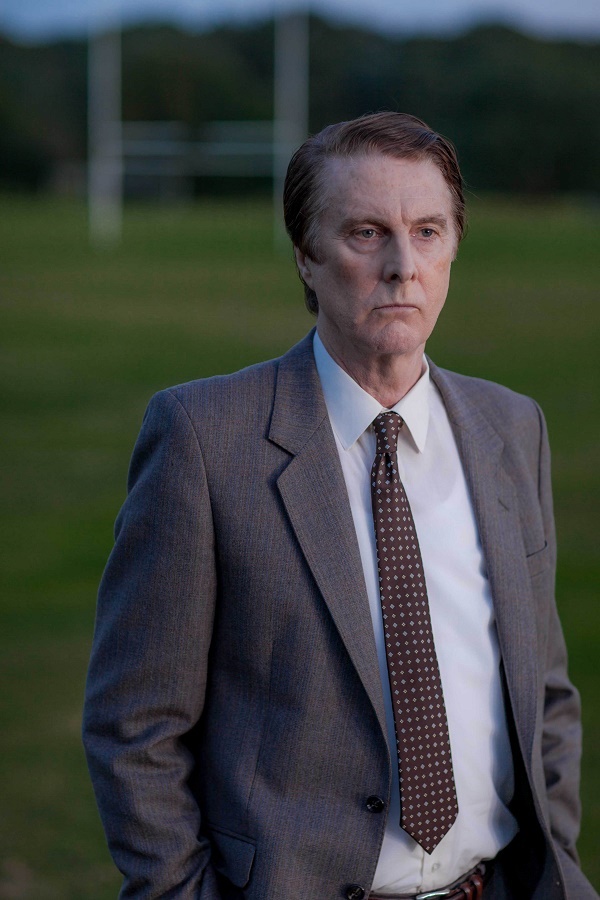Code of a Killer, ITV | reviews, news & interviews
Code of a Killer, ITV
Code of a Killer, ITV
The case in which DNA profiling was first used to catch a killer makes for gripping drama

DNA: there’s a lot of it about. Random Googling reveals that, just in the past few days, a new study claims arachnophobia may be programmed into our DNA, that the British share 30 percent of their DNA with the Germans, while in the USA they’re using DNA to track down dog owners who don’t scoop poop. This last may not be what Leicester University geneticist Professor Alec Jeffreys had a mind when he developed techniques in DNA fingerprinting.
Code of a Killer dramatises the case in which DNA was first used by police to pin a murder suspect to a crime scene (the concluding episode is broadcast next Monday). When we first met Professor Jeffreys (John Simm) he was lecturing students about genetic code, but his heart really belonged in the lab. He spent rather more time there trying to get a clear reading of seal meat DNA than at home with his lovely wife. “This work I do,” he explained to her (and us), “I get a bit carried away.”
 Meanwhile down the nick the rape and murder of a teenage girl in a secluded Leicestershire lane was puzzling the police. DCS David Baker (David Threlfall) had a hunch the culprit was a local, and a rare type of high sperm count further narrowed down the field. But three years on they were still essentially clueless when another girl became the victim of, it was presumed, the same killer.
Meanwhile down the nick the rape and murder of a teenage girl in a secluded Leicestershire lane was puzzling the police. DCS David Baker (David Threlfall) had a hunch the culprit was a local, and a rare type of high sperm count further narrowed down the field. But three years on they were still essentially clueless when another girl became the victim of, it was presumed, the same killer.
Thus two gripping hunts for a breakthrough ran in tandem. By the end of this intriguing first episode, DCS Baker had read about Jeffreys’s success in legally proving a young Ghanaian to be the son of his mother, thus establishing his right of residence. He turned to Jeffreys when a young man confessed to the second murder, but curiously not to the first.
There was the usual disclaimer that Michael Crompton's script was based on real events. It wasn’t difficult to see where fiction had insisted on reshaping the narrative for its own ends. Jeffreys’s marriage, the script briefly hinted, was under threat, only for his wife (Anna Madeley) soon to swing round behind him. She even turned up at the Ghanaian’s hearing. “If you’re proved right,” she helpfully signposted, “it’s going to change everything!” The script also laboured a little too hard to establish itself in the early Eighties. Jeffreys’s comely lab assistant went off to see “a new band from Manchester” called The Smiths. And hands up if you've had enough of the portentous signature slo-mos favoured by director James Strong in Broadchurch and now here.
But this wasn’t just a drama about lines of code on a dark-room print-out. The impact of the two murders – of Lynda Mann and Dawn Ashworth – was all too harrowing. The awful scenes in which the families were told felt like raw unmediated reality. Threlfall is superb as ever: wiry and soft like a human pipecleaner. Though perhaps a little overcommitted to detection in What Remains, he’s the TV copper you’d want in your corner – while Lorcan Cranitch was dougthy as the Luddite detective who wanted nothing to do with newfangled science. As for Simm, he looked at home in a lab coat and one of those pre-hipster beards, and for extra gravitas he’d dropped his voice by a good octave. When he had his Eureka moment, he exultantly clamped his hand on his assistant’s shoulder and quietly shook it. None of your modern hugging for the prof who changed the world.
more TV
 Baby Reindeer, Netflix review - a misery memoir disturbingly presented
Richard Gadd's double traumas are a difficult watch but ultimately inspiring
Baby Reindeer, Netflix review - a misery memoir disturbingly presented
Richard Gadd's double traumas are a difficult watch but ultimately inspiring
 Anthracite, Netflix review - murderous mysteries in the French Alps
Who can unravel the ghastly secrets of the town of Lévionna?
Anthracite, Netflix review - murderous mysteries in the French Alps
Who can unravel the ghastly secrets of the town of Lévionna?
 Ripley, Netflix review - Highsmith's horribly fascinating sociopath adrift in a sea of noir
Its black and white cinematography is striking, but eventually wearying
Ripley, Netflix review - Highsmith's horribly fascinating sociopath adrift in a sea of noir
Its black and white cinematography is striking, but eventually wearying
 Scoop, Netflix review - revisiting a Right Royal nightmare
Gripping dramatisation of Newsnight's fateful Prince Andrew interview
Scoop, Netflix review - revisiting a Right Royal nightmare
Gripping dramatisation of Newsnight's fateful Prince Andrew interview
 RuPaul’s Drag Race UK vs the World Season 2, BBC Three review - fun, friendship and big talents
Worthy and lovable winners (no spoilers) as the best stay the course
RuPaul’s Drag Race UK vs the World Season 2, BBC Three review - fun, friendship and big talents
Worthy and lovable winners (no spoilers) as the best stay the course
 This Town, BBC One review - lurid melodrama in Eighties Brummieland
Steven Knight revisits his Midlands roots, with implausible consequences
This Town, BBC One review - lurid melodrama in Eighties Brummieland
Steven Knight revisits his Midlands roots, with implausible consequences
 Passenger, ITV review - who are they trying to kid?
Andrew Buchan's screenwriting debut leads us nowhere
Passenger, ITV review - who are they trying to kid?
Andrew Buchan's screenwriting debut leads us nowhere
 3 Body Problem, Netflix review - life, the universe and everything (and a bit more)
Mind-blowing adaptation of Liu Cixin's novel from the makers of 'Game of Thrones'
3 Body Problem, Netflix review - life, the universe and everything (and a bit more)
Mind-blowing adaptation of Liu Cixin's novel from the makers of 'Game of Thrones'
 Manhunt, Apple TV+ review - all the President's men
Tobias Menzies and Anthony Boyle go head to head in historical crime drama
Manhunt, Apple TV+ review - all the President's men
Tobias Menzies and Anthony Boyle go head to head in historical crime drama
 The Gentlemen, Netflix review - Guy Ritchie's further adventures in Geezerworld
Riotous assembly of toffs, gangsters, travellers, rogues and misfits
The Gentlemen, Netflix review - Guy Ritchie's further adventures in Geezerworld
Riotous assembly of toffs, gangsters, travellers, rogues and misfits
 Oscars 2024: politics aplenty but few surprises as 'Oppenheimer' dominates
Christopher Nolan biopic wins big in a ceremony defined by a pink-clad Ryan Gosling and Donald Trump seeing red
Oscars 2024: politics aplenty but few surprises as 'Oppenheimer' dominates
Christopher Nolan biopic wins big in a ceremony defined by a pink-clad Ryan Gosling and Donald Trump seeing red
 Prisoner, BBC Four review - jailhouse rocked by drugs, violence and racism
Sofie Gråbøl joins a powerful cast in bruising Danish drama
Prisoner, BBC Four review - jailhouse rocked by drugs, violence and racism
Sofie Gråbøl joins a powerful cast in bruising Danish drama

Add comment